
It's happened before.
A new technology comes in, and what seemed like it had always been and always would be quickly becomes old-fashioned, unwanted, and a hard way to earn a living. Just ask your friendly neighborhood milkman or the owner of a corner Fotomat. In transportation, where change generally comes slowly, automakers' recent declarations that they plan to stop developing internal-combustion engines (ICE) and pivot to electrified lineups represent a real sea change. Arguably, the last radical move in the automotive industry occurred in the 1980s, when fuel injection wiped out carburetors, which was prompted by emissions regulations and high fuel prices. Sound familiar?
There have been plenty of ICE advancements since then, but they've been largely incremental: more injectors, more turbochargers, more sensors everywhere. Nothing to force an engineer back to the classroom. Now a big wave is about to crash on the industry, and everyone can either surf it or drown. This is no big deal for folks in marketing, who love a fun new trend, or even those in design electric platforms open up new spaces and shapes to play with. But what about those with engine right in their job title? Will engineers working on piston power find their careers stalling out like an emissions-era carburetor? Will students mid-degree find their diplomas as hard a sell as a steam car in 1930?
In 2021, CEO after CEO announced plans for electrification. The consulting firm McKinsey & Company predicts that EVs (battery and fuel-cell) will make up more than 40 percent of new-car sales in the U.S. by 2030. They currently constitute less than 3 percent, which means a lot of models would need to be designed, engineered, and purchased in the next eight years.
Diese Geschichte stammt aus der May 2022-Ausgabe von Car and Driver.
Starten Sie Ihre 7-tägige kostenlose Testversion von Magzter GOLD, um auf Tausende kuratierte Premium-Storys sowie über 8.000 Zeitschriften und Zeitungen zuzugreifen.
Bereits Abonnent ? Anmelden
Diese Geschichte stammt aus der May 2022-Ausgabe von Car and Driver.
Starten Sie Ihre 7-tägige kostenlose Testversion von Magzter GOLD, um auf Tausende kuratierte Premium-Storys sowie über 8.000 Zeitschriften und Zeitungen zuzugreifen.
Bereits Abonnent? Anmelden
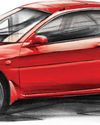
The Best Odds
SOMETIMES-NOT OFTEN, BUT sometimes-car manufacturers create something semi-wondrous that is also borderline irrational and three-quarters inexplicable to their own marketing types.
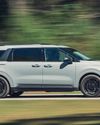
Mileage Booster
Kia Carnival Hybrid HIGHS: Big mpg bump, no CVT weirdness, solid ride and handling. LOWS: Shared HVAC and audio controls, second-row loungers can't be removed, changing brake-pedal feel.
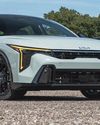
Medium Spicy
Kia K4 GT-Line Turbo HIGHS: Lengthy list of features, spacious interior, generous trunk. LOWS: Uncomfortably flat seats, rivals are quicker, only modest grip.
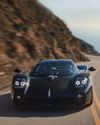
Drivelines
HORACIO PAGANI IS A visionary designer and self-taught engineer.
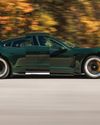
Suspensions of Disbelief
It's easy to say a vehicle rides well but much more difficult to explain the nuanced implications of that highly subjective statement.
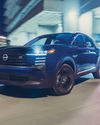
PUMPED-UP KICKS
NISSAN ISN'T SHY about experimenting with its subcompact of ferings. In the recent past, it briefly gave us the adorable Cube, seemingly designed by Hello Kitty, followed by the frog-eyed Juke that somehow spawned a six-figure R-badged super-SUV in other markets.
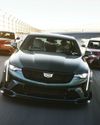
THE ALFA ROMEO GIULIA QUADRIFOGLIO. THE BMW M3 COMPETITION. AND THE CADILLAC CT4-VBLACKWING HEAD SOUTH ONA ROAD TRIP TO FIND OUT WHICH ONE BEST DELIVERS ON THE SPORTS-SEDAN PROMISE.
One of us, gassing up the 2025 Cadillac CT4-V Blackwing, says, \"No, we drove from Michigan.
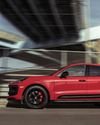
SINCE WE APPRECIATE GREAT TALENT IN ALL ITS FORMS, WE ALSO HONOR THE 10BEST TRUCKS, SUVS, AND VANS. INCLUDING ONE WINNER WITH LITERAL BUZZ.
THE DISCUSSION AROUND this year's 10Best Trucks competition had some editors wishing the award were called 12Best.

OUR VERSION OF A 2024 AUTOMOTIVE AWARDS SHOW (SOMETIMES HUMOROUS, SOMETIMES NOT).
America's fastest senior citizen made the save of the year when his Funny Car's engine exploded at Virginia Motorsports Park.

"A ROMANCE THAT BUILDS WITH SPECTACULAR PASSION. THE LONGER YOU DRIVE IT, THE BETTER IT GETS."
When the history of the sports sedan is written, the late-narrative plot twist that few would have seen coming is the emergence of CadillacCadillac!-as the keeper of the flame. And yet, that's exactly what's happened.